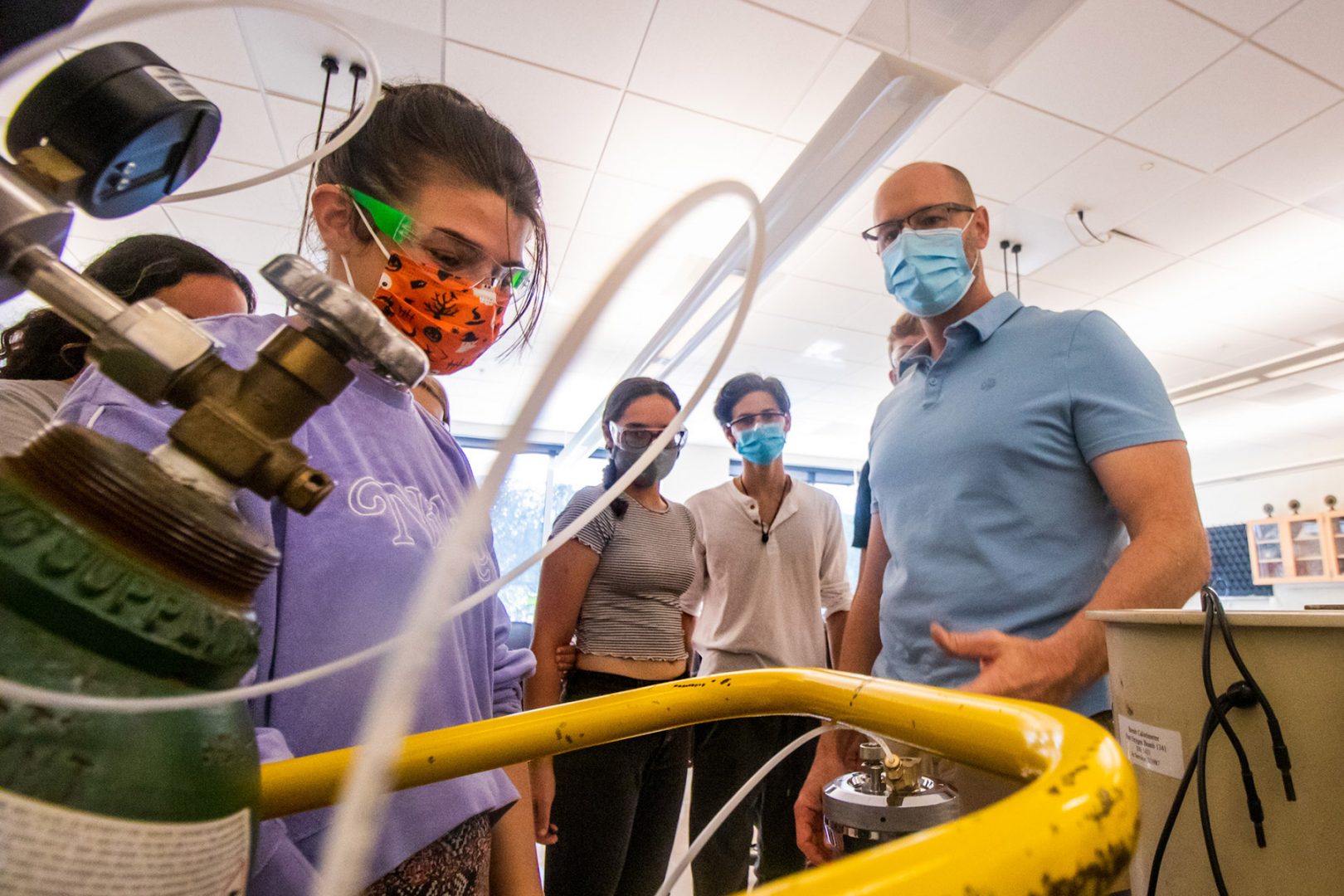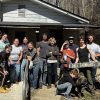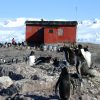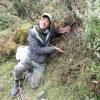It makes perfect sense, Joe Larkin, Ph.D., associate professor of chemistry at Eckerd College says with a grin.
Most people know at least something about how a car works. And many of the basic principles of chemistry and physics are on full display underneath the hood.
So use a car engine to help explain how chemicals react or how heat is transferred. And then go a step further and bring some engine parts into the classroom. Or even an entire engine. And what about that 1990 Ford F-250 pickup truck that was donated to Eckerd? Use that too.
These are some of the learning tools Larkin relies on to help his students navigate the world of chemistry and physics.
“I want to demystify what we’re talking about,” says Larkin, who teaches General Chemistry I and II as well as Physical Chemistry I and II. “A car is something most people can understand. Well, thermodynamic principles are used in making internal combustion engines more efficient. A real working example is a car engine. It takes in air, there’s a spark and [there’s] a chemical reaction that drives the piston down.”
To underscore his message, he keeps a couple of used pistons in his classroom and his office. “It’s better when the students actually see a piston, touch it and see all the soot left from the combustion process,” he says. “Then they start getting engaged.”
To keep up with the technology, and just because he likes to solve puzzles, Larkin is never far from an engine. In addition to teaching class, spending time with his wife and two children, and his responsibilities as the chair of the Natural Sciences Collegium, he works several hours a week at Ferman Ford in Clearwater. As a certified technician, he does everything from tune-ups to complicated diagnostics.
“It’s just a passion,” Larkin says. “And I learn something new every time I go there. The people I work with are some of the smartest, most clever people I’ve ever met.”
Joseph Wheeler, a former senior master technician who is now parts and service director at Ferman, says not only does Larkin’s knowledge “go a long way to help other techs, [but] utilizing pistons or other engine parts to explain how chemistry and physics work is one of the best ways to teach. It brings the principles to life and turns teaching into a demonstration that students can relate to.
“And it’s very cool to have Joe as a tech,” Wheeler adds. “He’ll go the extra mile for anyone.”

Professor Larkin working under the hood, literally.

Professor Larkin reads the thermometer for the bomb calorimeter. Photo: Angelique Herring ’19
There is another, more personal, reason Larkin makes the 45-minute drive to Clearwater. “I grew up poor,” he says. “And it’s always been hard for me to pay someone to fix something when I can do it myself. So I learned how to repair cars, and working at Ferman is an extension of that.”
Larkin grew up in Phoenixville, Pennsylvania, a working class suburb of Philadelphia, and knew at a young age he wanted to study science. “So I took a chemistry class and liked it,“ he says.
Indeed. He earned a Bachelor of Science degree from Jefferson University and a Ph.D. in chemistry from the University of Georgia with a concentration in quantum chemistry. His postdoctoral training was at the National Institutes of Health (NIH), where he worked on methods for studying biochemical systems over different time and length scales.
His research interests include computational modeling of boron-containing small molecules as saccharide sensors and cancer treatments.
In 2014, the NIH awarded a $747,000 grant to Larkin and Eckerd College to fund computational modeling of how certain cancer-fighting drugs interact in the human body. It was the first NIH grant ever awarded to Eckerd.
But there is still general chemistry to teach. Luca Montore, a senior biochemistry major from Calais, Vermont, took Larkin’s general chemistry class as a first-year student and is in his physical chemistry class this fall. Luca also is a chemistry tutor.
“Dr. Larkin brought in a functioning piston to help us learn about the concepts of thermodynamics—like how pressure, volume and temperature relate to each other,” Luca says. “And it was extremely helpful because learning about thermodynamics when you’re looking at a blackboard, it’s just a theoretical concept. But when you see it actually applied in real-world examples like a car engine, it makes it much easier to wrap your head around these sometimes harder to grasp concepts.”
And yes, he knows about Larkin’s second job.
“I didn’t realize how much background information and knowledge of chemistry [are] required in those types of jobs,” Luca says. “And it’s cool that Dr. Larkin still makes time for doing something he clearly likes so much.
“It’s funny, but by the end of the semester, he’ll know what kind of car everyone drives.”













